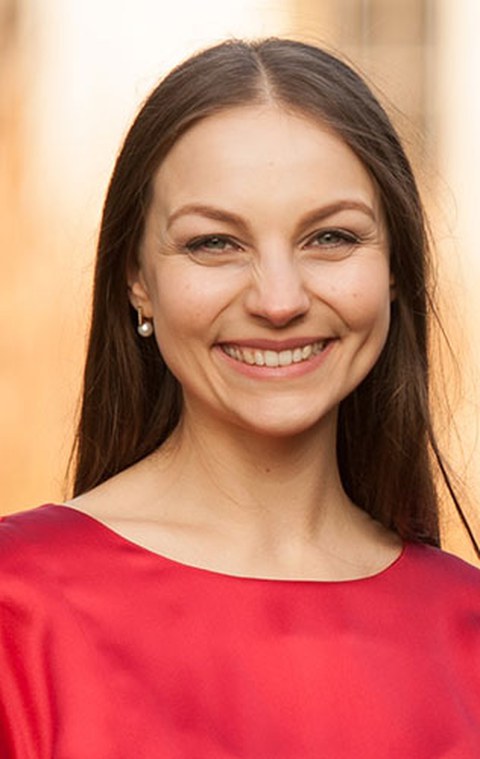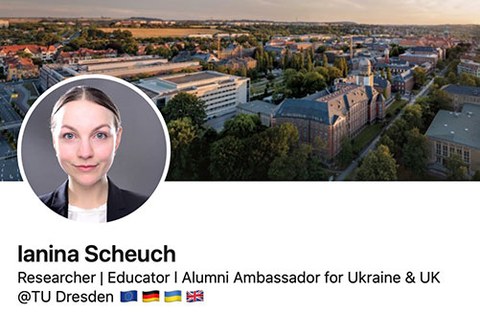Regional ambassador for Ukraine and the United Kingdom at TUD
(Interview from 2022)
Susann Mayer
Meet the regional ambassadors: Ianina Scheuch studied International Relations and Business and Economics. Based in Dresden, she supports the global community of TUD regional ambassadors, and works to internationalize TUD and develop international relations.
Over recent weeks, the native Ukrainian has been driven by concern for her compatriots, whom she is tirelessly supporting literally day and night using all her contacts and connections. Scheuch is a junior researcher with an extensive international network who works on resilience, and was just about to submit her thesis when the war started. She sat down with the editor (whom she has known for a long time and is on a first-name basis with) to talk about her career, the current hardship in Ukraine, and her work for young Ukrainian academics.
Ianina, thank you for agreeing to tell us about yourself despite overwhelmingly terrible current events. Can you tell us why you chose TU Dresden?
I studied Business and Economics and International Relations in Ukraine and in Germany. Even as a child, I was interested in other cultures, art, literature, and human rights, and wanted to experience other countries for myself. That is why I took part in a German-Ukrainian DAAD [German Academic Exchange Service] exchange program, after which I studied Business and Economics and International Relations with a scholarship from the Konrad-Adenauer-Stiftung foundation. While pursuing my degree, I got involved in international issues, in particular in supporting students from other countries. International issues and integration have therefore been constants throughout my life. As it was important to me to broaden my horizons and improve my language skills, I ultimately came to Dresden to study. Today, after a number of years in other cities and countries, my family and I are very happy and grateful to have found our home in Dresden and at TUD.
What are you working on / researching at the moment?
I am currently working on MP-INVET – a metaproject on research for the internationalization of vocational training. The joint project is funded by the Federal Ministry of Education and Research (BMBF) and is being led by TU Dresden, the University of Mainz and the University of Bremen. At TU Dresden, the project is managed by the Chair of Adult Education/Vocational Education and Training and Comparative Education. We are in charge of monitoring, evaluating, and linking up international research projects in Europe, Asia, and Africa. In terms of research, I work primarily on current issues surrounding the promotion of resilience and diversity, and I am working toward a doctorate at the Faculty of Business and Economics. I am currently leading a TransCampus project on enhancing student resilience and wellbeing in collaboration with Kings College London (KCL).
I know you are also involved in many other projects …

Ianina Scheuch is a TUD alumna and regional ambassador
I use my experience in international projects in the field of education and culture, organizing and facilitating workshops and seminars for foundations, for example. And – of course, that’s how we know each other – I volunteer as a TUD regional ambassador, and also as a mentor for young women in research and school students, especially those with other cultural or linguistic backgrounds.
What would be your advice to younger people today? Many people from Ukraine are coming here at the moment.
Germany offers a lot of opportunities, but you also have to work very hard for success. This is true for everyone; you have to give luck and chance a push with hard work and commitment. Today, however, the situation is different from what we know. Many young people have had to leave their families and friends in Ukraine. They feel helpless and do not have the strength or motivation to drive them here. They need our help and individual support – and I am happy to be able to help out as a regional ambassador at TUD.
As a regional ambassador for Ukraine, your usual role is supporting both countries with student and researcher exchange. Since last week, the main focus has been on supporting fellow Ukrainians. Can you briefly describe what happened in the first few days?
February 24th was a turning point. With the invasion of Ukraine, our personal stories and histories have also changed. The attack started early in the morning. My family in Ukraine heard there was a bomb threat and called me immediately. They have stayed there and started a school for refugee children. My brother woke up in his dormitory in Germany. He was supposed to fly back to Ukraine the next day because his Erasmus exchange period was over and his German residence permit was about to expire. My cousin from London was in Ukraine visiting her grandparents and her little sister. She wanted to stay there after the attack to help on the ground. I had to act immediately – for my family, but also for all those who needed my help. Within an hour, I had received 500 emails in German, English, Ukrainian, and Russian telling me where my help was needed. On February 25, 2022 – my birthday (and the day I wanted to submit my thesis, which had to be postponed) – I was able to put 300 people, including students and professors, in contact with the support systems they needed. Looking back, I see now just how much we were able to achieve in those first few days, and I am very grateful for all the support from all those who helped, or simply took to the streets in Berlin, Hamburg and Dresden.
Shortly after the outbreak of war, the Alumni Relations Office anxiously got in touch with our Ukrainian alumni, and provided you as an emergency contact in Dresden. A successful example of that support is another regional ambassador, Dr. Nataliya Sadretdinova, who has come to Dresden with her children.
Yes, I am very happy that we were able to help another family from Ukraine. Dr. Nataliya Sadretdinova is from a suburb of Kyiv and had to leave her home immediately after the attack. We brought her and her two children from Wroclaw on the weekend and got them an apartment in Dresden. Since then, we have taken her into our family and provided advice and support. We help with formalities and bureaucracy, with integration and finding a school. We answer questions about everyday life, arrange language courses, and show them around the city and the surrounding area. We spend time together and talk, as a normal environment is also so important for all of them. Dr. Sadredinova recently received a DAAD scholarship to conduct her new research project under the leadership of Prof. Yordan Kyosev at TU Dresden’s Chair of Development and Assembly of Textile Products. Other women and children are also arriving in Dresden, and Nataliya has been helping out herself. We help each other and it is wonderful to see how people are opening up and supporting each other.

Greeting at the TUD Alumni Affairs Office: Dr. Natalija Sadretdinova (2nd from left) with her children Marina (left) and Ruslan (right), Susann Mayer (Alumni Affairs Officer, center), Ianina Scheuch (2nd from right).
Thank you so much, Ianina, for all that you are doing. To conclude, what would you like to say to the readers – all of them TUD alumni like you?
I think everyone can help. We all have a voice to call for peace. I know that together, we are strong. As a Ukrainian, between East and West – growing up bilingual – I never chose the easy path in life, but I also try never to go it alone. We, the TU Dresden community, can help if we do it together. From the central “We-Care” TUD point of contact and projects at the faculties such as language courses at the Institute of Slavic Studies, to countless initiatives that students can join such as the Refugee Law Clinic and the Learning Workshop for schoolchildren in Ukrainian – everyone is helping out.
Across the city of Dresden, too, and at a national level, there are already so many great initiatives and platforms where you can help. It would be great if even more people could help families from Ukraine in these difficult times.
A word from the editor
WE-CARE is the TU Dresden point of contact for comprehensive information on services and available support for refugees. The focus is on TUD students, researchers, and alumni from countries affected by the war.
Recently, the university submitted applications for Dr. Natalya Sadretdinova and ten other Ukrainian scientists to receive funding from the Alexander von Humboldt Foundation's Philipp Schwartz Initiative. A funding commitment would enable her to continue her research at TU Dresden for the next two years. Until then, she will be working at Prof. Yordan Kyosev's Institute for Textile Machinery and Textile High Performance Materials Technology, supported by a DAAD scholarship.
There is also a relief fund campaign run by the Society of Friends and Supporters of TU Dresden for students and researchers in need because of the war.
And a word on Ianina Scheuch: When asked by the TUD pupil mentoring program, she immediately agreed to be interviewed and answer school pupils’ questions about her International Relations degree. The project is aimed at making young pupils aware of the challenges of studying and introducing them to the potential professions associated with specific degree programs. Benedikt Wiedenhofer also took part. Everyone agreed that the event with the IR alumni was a great success.
Contact:
TU Dresden
Fakultät für Erziehungswissenschaften
Institut für Berufspädagogik und berufliche Didaktiken
Professur für Erwachsenenbildung
01062 Dresden
Tel.: +49 351 463-39296
Email
Website

